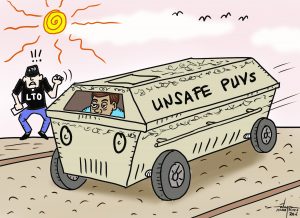By Brian James Lu
ON SEPT. 14, 2009, the Quezon City Council approved the Participation, Accountability, and Transparency (PAT) Ordinance of Quezon City. It is an “ordinance strengthening and institutionalizing the system of partnership in local governance between the Quezon City government and the people of Quezon City.”
The ordinance created the People’s Council of Quezon City (PCQC), which serves as the umbrella council for the general assembly of civil society organizations (CSOs) and private/business organizations. In 2022, the Quezon City Council further strengthened the PAT ordinance by coming out with its implementing rules and regulations.
In recognizing the importance of the PCQC, Mayor Joy Belmonte stated that the “People’s Council will serve as the eyes, ears, and voice of the people in our city government. Their skills will go a long way in developing the right and appropriate programs for the residents.” The People’s Council represents various sectors, such as academia, business, professionals, women, senior citizens, solo parents, homeowners’ associations, persons with disabilities, and the urban poor, among others. As of February 2024, when Mayor Belmonte swore in the executive committee of the 1st People’s Council of Quezon City, there were 5,350 accredited CSOs.
The PCQC can sit in the city’s local special bodies, such as task forces and committees, among others, through their elected representatives. They can participate in all of the committee’s deliberation, conceptualization, and evaluation of projects.
People’s Councils, also known as local councils or community assemblies, play a crucial role in the effective functioning of local government units (LGUs). These councils serve as platforms for citizen engagement, participation, and decision-making at the grassroots level. The establishment of a People’s Council nationwide is in response to the call of the Department of the Interior and Local Government (DILG) for the institutionalization of a People’s Council and CSO desks in all LGUs nationwide.
In its 2022 year-end report, the DILG stated that 1,063 LGUs (45 provinces, 99 cities, and 919 municipalities) have already set up CSO desks. People’s Councils, on the other hand, are organized in two provinces, 13 cities, and 104 municipalities.
Being an advocate of people’s participation through the CSOs, I am happy that many LGUs are now in the process of establishing their own People’s Council. There is, however, a need to empower the CSOs, with the LGUs spearheading capability-building activities.
By the way, who or what are CSOs? For its official definition, I came across the United Nations which states: “A civil society organization (CSO) or nongovernmental organization (NGO) is any non-profit, voluntary citizens’ group that is organized on a local, national, or international level.” The Philippines went a step ahead by accrediting the CSOs, making them a part of local and national governance, and organizing them in People’s Councils.
People’s Councils serve as a cornerstone of democratic governance by providing a mechanism for direct citizen representation. Through elections or other inclusive selection processes, council members become the voice of their communities, advocating for local interests and concerns. This democratic structure enhances the legitimacy of decision-making processes and fosters a sense of ownership and accountability among citizens.
One of the primary functions of People’s Councils is to facilitate active citizen participation in local governance. These councils serve as forums where residents can express their views, share feedback, and contribute to the decision-making process. Engaging citizens in this manner fosters a sense of community, strengthens social bonds, and ensures that policies align with the actual needs and aspirations of the population.
People’s Councils contribute to inclusive decision-making by representing diverse perspectives within a community. By including members from various demographic groups, socio-economic backgrounds, and sectors, these councils ensure that policies and initiatives address the needs of the entire population. This inclusivity is vital for creating equitable and sustainable development strategies. In Quezon City, there are 23 sectors represented in the People’s Council that are actively promoting the rights and welfare of their constituents.
People’s Councils play a critical role in identifying and prioritizing local development needs, where local issues often require context-specific solutions. By involving community members in the decision-making process, councils can contribute to the formulation of policies that address unique challenges and opportunities within the locality. This bottom-up approach promotes more effective and sustainable development outcomes.
With People’s Councils, transparency in governance has become a key factor in keeping citizens informed about local government activities, budgets, and decision-making processes. This transparency, coupled with direct citizen engagement, fosters a culture of accountability. Council members are held responsible for their actions, ensuring that resources are used efficiently and in the best interest of the community. People’s Councils must be vigilant in asserting their roles in the LGUs, considering that without people’s participation in governance, vested interests may prevail.
The People’s Council may foster conflict resolution and social cohesion. Local communities may face various challenges and conflicts. People’s Councils serve as platforms for dialogue and conflict resolution, helping to build social cohesion and harmony within the community. By providing a structured space for open communication, councils contribute to the resolution of disputes and the promotion of unity among residents. This is not, however, a substitute for the Katarungang Pambarangay system that is being practiced at the barangay level. At the community level, dialogue should be the first resort of leaders so as not to clog the legal system.
The Department of the Interior and Local Government has provided the people with a platform to exercise their constitutional right to participation. I remember that the 1987 Constitution enshrined in its pages that the “right of the people and their organizations to effective and reasonable participation at all levels of social, political, and economic decision-making shall not be abridged.”
Indeed, the local People’s Councils are indispensable components of local governance, serving as important aspects of democratic representation, community engagement, and inclusive decision-making. By empowering citizens to actively participate in the governance process, People’s Councils contribute to the creation of resilient, vibrant, and sustainable local communities. Recognizing and nurturing the importance of these councils is essential for fostering effective local governance and ensuring the well-being of citizens at the grassroots level.


